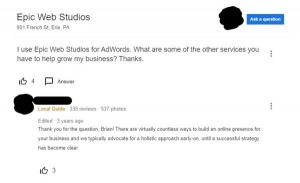Mark Organ thinks very differently about how to evolve as a founder-CEO now that he’s on his second company. A decade ago, Mark co-founded customer relations management software company Eloqua. “I held on too long to all the details of the business,” he says.
Even though the company had reached several million dollars in revenue, “I really enjoyed going on sales calls and the rush of closing deals, but if we had hired a head of sales six months earlier, we would have grown faster. I was a novice salesperson and should have hired a great sales leader.” Eventually, he left the company, which went on to go public with different leadership.
This time, founding and running Influitive, an advocate marketing platform that helps businesses manage and motivate their most influential customers to drive referrals and references, he’s hired managers sooner, learned to delegate, and to make a mental transition. (Note: CommonAngels Ventures is a seed investor in Influitive, and James Geshwiler was on the board of directors for two and a half years.) “Early on at Influitive I called myself ‘founder’,” Organ says. “Now I call myself ‘CEO.’ When I am in the office, I often feel like I’m a bureaucrat, rather than a swashbuckling entrepreneur! I don’t actually do much directly, and constantly need to ask myself ‘do I need to make that decision or should I have empowered someone else who has more knowledge or expertise than me.’”
“The founder-CEO is a great generalist,” he says. “They can do a lot of things in a good-enough way. They are willing and able patch the holes in the ship as required.” That is mission-critical at the nascent stages when a company is getting established and seeking to find product-market fit. However, once two key things take place, the company must shift to what we call scaling: 1) market growth is accelerating—not just for this company but for most of the players in the market, and 2) the company has learned how to hire more people effectively and understands how long it takes for those new hires to generate enough revenue to pay for themselves. Scaling is not a luxury at this point—it’s a necessity to avoid being left behind.
Recognizing that the time for scaling is approaching—and laying the groundwork for it—is really hard. It’s clouded with the complexity of never-ending tasks and frequent crises. It also involves as many internal issues as external ones. To help the CEO navigate this period, we have developed this list of four tough questions startup CEOs need to ask themselves in order to lead the company into the scaling phase:
1. Have we actually hit product-market fit? Failing to elevate the company to its next state fast enough can lead to failure, but so can doing it prematurely. Paul Aitken, CEO and founder of Borro, knows the struggles of hitting the right window. He says, “We’ve hit product-market fit in the last nine months. This has come through times when we have not moved along at a fast enough pace, and times when we have been too fast and gotten ahead of ourselves.” Borro launched in 2009 in the UK, and has gone on to open offices in New York and Los Angeles. It is the leading online platform for luxury asset-backed lending and has raised over $ 200 million in total capital. Very few companies get the timing of product-market fit perfect. The key is in how quickly you react when you don’t have it right. For instance, you thought you found that fit so expanded your sales team to bring in the “guaranteed” customers, only to find out sales didn’t occur. You’re strapped for cash, so do you keep funding the new hires or retrench until you find that fit. It’s a very tough question with no clear answer, so many CEOs choose to wait to get more information. However, not making this decision fast enough could mean the loss of your business.
2. Can I stop being addicted to being an individual contributor and start viewing success as being able to hire transformational people? Founders often start out as the business and product expert. As the company grows, so must the knowledge, and one person just can’t know it or do it all. You wish you could clone yourself, but that hasn’t been invented yet. You must trust others with your baby and accept that you need additional talent if you’re going to scale. “You need to be excited about your job changing,” Organ says,” and let go of the rush of working on product and doing sales calls. Stop obsessing about product and start obsessing about recruiting.” Aitken sees the necessity of recruiting well, too, but also says that “even after doing startups for 11 years, I still have situations where I know I have gaps, but finding the right person to fill them seems a major challenge every time.” Recruiting should always be on a CEO’s mind.
3. If I hire transformational people, can I learn to manage them? “If you’re good at hiring, then they are smarter than you and more skilled than you are,” Organ cautions. Some will downright outsmart you whether for compensation or in technology choices to suit their own ends. You have to establish and maintain trust as well as have open lines of communication. The CEO needs to set up clear expectations, measure against them, and compensate accordingly. “Even I’m getting paid differently,” Organ says. “The board now compensates me more like an outsider because I’m paid to lead, and if I can’t do that then the board should bring in someone who can.” Setting up clear expectations should also go hand in hand with what Aitken says is critical, “to empower them with resources to allow them to try things out.”
4. Which kinds of processes will we need to have in place? (And, which do we need to stop?) The CEO needs to know the first cohort of customers intimately. “As soon as you start to see the new customers look like the old customers,” Organ warns, “it’s time for the founding CEO to get out of the day-to-day sales process.” Instead, the CEO needs to shift his or her focus to company operations to support sales and the increasing number of customers:
i) Communication processes. No longer will it be a tight group of comrades sitting around with the ability to constantly share information. You won’t be able to touch base with people every day. The company needs a clear mission, shared vision, and explicit values.
ii) Product roadmap. Determine priorities and tasks rather than just lists of features. And, importantly, stay on schedule because there are a growing number of interdependencies. CEOs, and all managers really, should be working to eliminate obstacles and distractions so their people can do their jobs. A product roadmap is a tool to prevent you from getting off track.
iii) HR Processes. “It was a controversial move,” Organ says, “but I hired a ‘VP of Talent Operations’ early on when we were only about 55 employees to make HR a core competence.” Without process, interviewers typically ask the same questions and the questions are not strong enough to elicit the rich feedback the company is seeking. Rather, recruiting should have benchmarks to be able to compare candidates objectively. Influitive measures the hard costs of hiring, and has division of labor in interviewing, with assigned roles and scoring. Companies also need onboarding and training processes. No longer is it enough to show them to the nearest open seat and provide them with a laptop and a phone.
(186)









